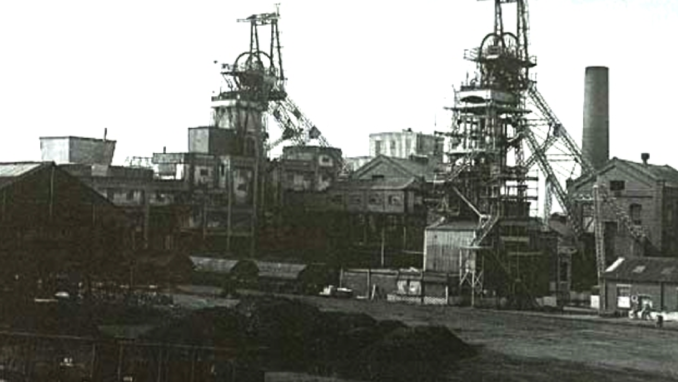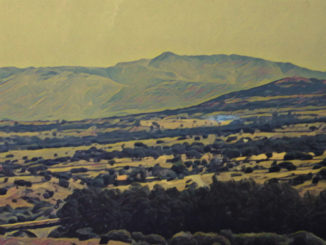
St Helens Photo Montage,
Cathie Garner – Licence CC BY-SA 2.0
My colleague Captain Davies and I are in the constituency office of wet Tory grandee Major Sir Fergus McDee MC MP.
Three hundred miles to the south, former Prime Minister Maurice Harold Macmillan, 1st Earl of Stockton, is poised to use his place in the House of Lords to speak out in support of the strikers in a divisive miner’s strike which threatens to tear the country to pieces. Striking miners have been causing chaos while types like Davies, as a picket line agent provocateur, and myself as a research department wallah disguised as an insurance assessor have been trying to stop them. I’m on the propaganda side while mountains of pre-strike coal and imported coal, working or ‘scab’ union members and phalanxes of police address the practicalities.
Macmillan’s speech must be received by an almighty silence, rather than a rallying call, therefore Sir Fergus and others on the nappy-filling wing of Government must be encouraged to sit down and be quiet. This is part of an overreaching long term protocol designed to cure the country’s ills. A protocol so secret the public know nothing of it and the likes of myself only what we’ve been able to ascertain from nods, winks, crumbs from high tables and the occasional left open file or unlocked cabinet.
In the MP’s Sleescale office the Feng Shui wasn’t ideal. I was sat on the ‘passenger’ side of Sir Fergus’ desk, but Sir Fergus was stood behind, looking down on me and glowering while leaning against a window. Davies was sat to my side but, although my hands are positioned workmanlike in front of me, his are folded on his lap, as a neutral observer rather a supporter.
All the same, I must commence.
I had reminded Sir Fergus less coal and more nuclear would help his constituency which contained a significant but discreet atom plant. I have reminded him of the overarching importance of the Protocol but, as he sipped from an exceptional generous mid-morning measure of spirits, he remained unconvinced.
Having waved the matadors red cloth, I prepare to prod with the beast with an iron.
In my cover as an insurance salesman, I am wearing the sharp suit of the Royal and Industrial Insurance Company, complete with an embossed name badge. Over the previous weeks, in response to adverts placed from London by my department, I have been hearing damage claims from locals people. Claims that allowed me into their houses and into their confidences. I can now put this intelligence to use.
“Nothing is off the table, Sir Fergus, the Protocol is all-important. The miners’ strike must be defeated and all right-minded citizens, especially those in high office have a role to play. The higher the profile, the greater the obligation. When Earl Stockton speaks you will not support him.”
Sir Fergus lowered his brow and snorted like a bad-tempered bull provoked into pawing the dust.
“Because of your success in tanks during the war, your first Government position was as a junior minister at the Ministry of Defence.”
“And?” He responded provocatively.
“And at the time, part of your brief was Grapple. The atom bomb tests in the Pacific.”
“Dam proud of Grapple, a remarkable achievement and in a short space of time on a shoestring. Happens it stopped the Third World War too, in case Johnnie Commie had that in mind.”
“Indeed, but the men weren’t well looked after,” I tapped my insurance company name badge, “and suffer ill health decades later.”
“Where’s this leading, Worth?”
“As you are aware Sir Fergus, those men are the salt of the earth, excellent chaps, who don’t like to complain. But they can be encouraged in that direction. Front page of the Sleescale rag? Irresistible local angle with you being the junior minister in charge of such things at the time.”
“Bugger off, Worth, they were as well protected as possible, given the times and the circumstances.”
“But the readers aren’t going to spot that are they? They’re going to respond to the photo of the ill granddad wearing a row of medals, sat in the front room of his one up one down terraced house. Above him, a headline written by someone like me. Don’t worry, you’ll be on display too, on the bottom right corner, in the blame box, standing outside the family manor house on your country estate out on the moors.”
“This is an outrage,” he responded, snorting, “I have friends in Fleet Street, important people. They’ll blow you out of the water, make mincemeat out of you.”
“No, they won’t,” I informed Sir Fergus. “The Press Barons will follow the Protocol. De-unionise the print rooms and bring in new technology is there too. One step at a time. First kill the miner’s union, close the unprofitable mines and privatise the profitable ones. Fiends in Fleet Street are too busy biting their lips and thinking about the money to be made from a reformation in their own chapel.”
I asked him who he thought was paying for the likes of me and Davies? I told him not to assume it was the old duffers high up in our London departments who were not only strapped for cash but were a little too comfortable managing decline. If he suspected a whiff of the private sector about us, that we were a new breed of semi-detached Crown servants, he wouldn’t be wrong.
Davies chipped in, not so much on my side of the argument, more on the side of telling cold hard truth to power in his usual direct manner.
“I think of myself as a defence contractor at the moment. Mercenary’s a bit of a strong word. Back to my regiment when this is over, via my selection course for the elite forces. They say a bit of off the radar private sector work sounds impressive in front of a selection board these days.”
“And I sell and stories to the newspapers,” I chipped in, “Ever read the Beau Peeper kiss and tell scandal column? Want a mention?”
“Kiss and tell scandal?” Asked Sir Fergus, cowed like a mighty bull forced to take a step backwards.
I reached into my pocket, took out my Royal and Industrial notebook and opened it somewhat dramatically at a bookmark.
A couple of weeks earlier, heeding Davies’ advice to steer well clear of young Miss Cartwright on the counter below our corner shop digs, I had done my emergency buy at the new mini-mart near the docks. Crossing the near-empty car park in the twilight, clutching my carrier bag to my chest to keep its contents dry, and bracing myself both against the rain and the anticipation of a steep climb through the cobbled streets, something caught my eye.
Fresh flowers lay on a parking space’s wet tarmac. I walked past but, thinking better of it, wandered back to stand and eye them. They must have been dropped by accident by a shopper. A shame if they went to waste, I picked them up and recced about. Only one other person was in sight. A lady in a headscarf and a plain coat pulled a long-handled fabric shopping trolley behind her nearby.
“Are these yours?” I asked, voice raised as she was a dozen yards away.
“Put them back,” she instructed as she turned and approached me. “You’re not from around here are you?”
I set off with my well-rehearsed tale of my mother’s side of the family having relatives in Anthracite Street and of having gone down to London because of Thatcher, and of having come back to Sleescale because of Thatcher.
The lady waited and, as soon as I’d finished my spiel, spoke.
“You should know better, but them back.”
I laid the flowers back to the ground, in the damp. No doubt I appeared puzzled. She pointed towards the bouquet.
“That’s where the shaft was. They built a mini-mart on top of the mine, as though none of us would remember. Sleescale North Vein. The disaster. The memorial’s over yonder,” she nodded in the direction opposite to the store, “Where they hope nobody will notice.”
I excused myself and found a plaque attached to a concrete wall at the harbour end of the car park. Made of cast iron, raised lettering picked out in gold stood out from a black background. I took out my work notebook, found the first blank leaf, and began noting down names. Names I now read out for wavering Major Sir Fergus McDee MC MP burdened with his dewy eyed nostalgia for compromise and the preservation of the scruffy half of the mining industry.
“James Jenkins, fourteen, William Hitchings, thirteen, Thomas Day, eleven, Thomas Cole, fourteen, Miner John, child.”
I continued for a while. The list was long. I stopped halfway through to spare my breaking voice.
The room had fallen silent.
I turned the page in my notebook and prepared to read another, more contemporary, list.
“The problem is,” I began as a prefix, “no matter what one does one’s wrong. Hence the need for a Protocol to be followed, a hymn sheet for you to sing from, Sir Fergus, or be destroyed by scandal.”
To be continued…..
The Goodnight Vienna Audio file



